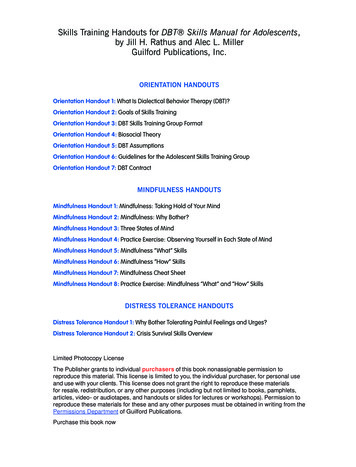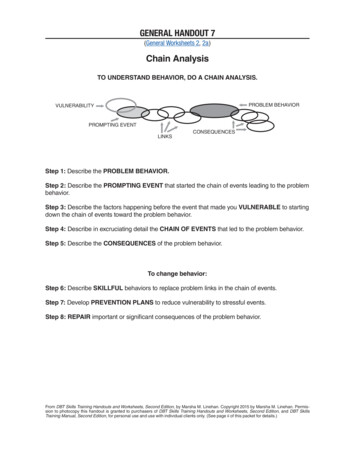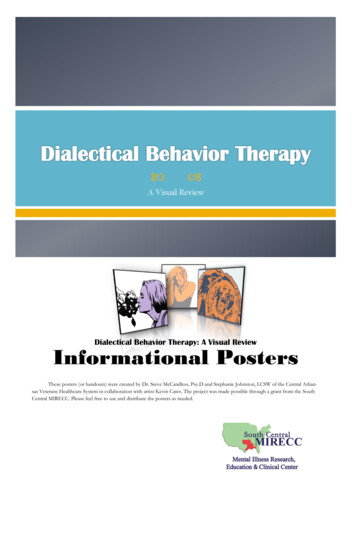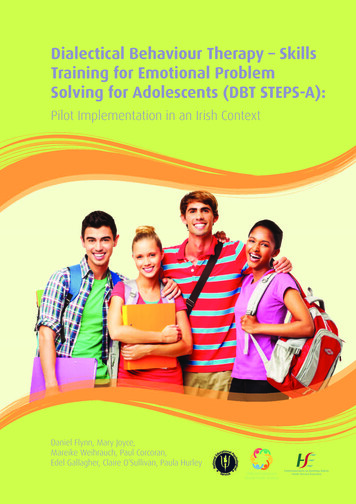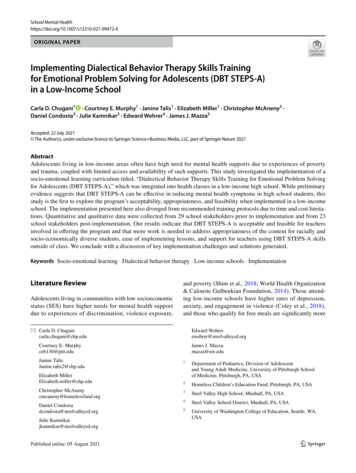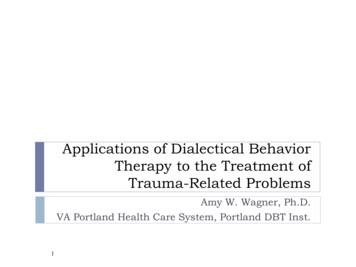
Transcription
Overviewof DBTHandouts
Meta SkillsSkillDescriptionMindfulnessEffectively Working to be as effective as we can in our lives. Identifying what is more effective and avoiding less effective strategies and behaviors inour lives. Avoiding judgmental words such as better, worse, good, or bad.Balancing Rational Mind and Emotional Mind to create Wise Mind.Wise MindWe are able to be mindful and effective when we can have both Rational and Emotional Mindpresent in our experience. Be sure not to judge Rational Mind as good and Emotional Mind asbad. Neither is good or bad, just part of our experience in life.By being in Wise Mind, we are in balance and have all our senses, ways of knowing, and skillsat our disposal to manage our lives effectively and to act in our best interests.Nonjudgmental Suspending evaluations about self and others. Judging behavior as right or wrong, good or bad, but not judging the person engaging in thebehavior. Behavior can generate natural consequences, but we don’t label the person. Describing things concretely, in nonjudgmental terms. Liking or disliking things, while not judging ourselves or others. Holding values that are beliefs or ethics, not judgments.Distress ToleranceRadicalAcceptance Example: The Serenity PrayerWe have the ability to control our thoughts, feelings, and actions.We may have limited control over what happens around us and what others do.We can effectively focus our attention and energy on what we can control and change:ourselves.Emotions ion)SleepSpiritualityInterpersonal EffectivenessGIVEGentleInterestedValidateEasy MannerFASTFair to SelfApologize LessStick to ValuesTruthful with SelfDescribeEncourageAskReinforceSometimes toleratingnot getting my wayExperiencing thepresent momentmindfully, inside andoutside my bodyListeningskillfully tomyself and othersFinding negotiationopportunitiesDEAR SELF
MEDDSSUseMasteryExerciseDietDrugs (Prescription)SleepSpiritualityto be skillful.Strategies I can use to practice MEDDSS daily:Barriers & obstacles to practicing MEDDSS:Ways to problem solve barriers & obstacles or do it anyway:
Being EffectiveBeing effective is about what works. Some things work, but may be less effectivethan others. Actions can express beliefs and feelings; actions can also get what isdesired. Sometimes actions accomplish these things but create problems, causeharm to self or damage relationships. In these cases, the actions are lesseffective. This skill is about identifying less effective strategies and using onesthat are more effective. Practice being effective with yourself, in relationships,at school or work, when relaxing , while having fun, and any other situations youmay encounter in life.Areas of my life I want to be as effective as possible:Some ways I have that are less effective:Ways I can be more effective:
Wise MindEveryone has the capacity to be in WiseMind. Being in Wise Mind takes balancingthinking and feeling. Being out of balance iswhen you are primarily in thinking orprimarily in feelings. Being able to have alittle bit of thinking and feeling present inyour experience most of the time leads tobeing responsive to yourself, others, andsituations you are in.I tend to be out of balance with my thinking & feeling when:Ways I have gotten in balance:Ways I can be in balance more often:
DEAR SELFThis skill is designed to help you ask forhelp or accomplish a task.D Describe what is wantedE Encourage others to helpA Ask for what is wantedR Reinforce othersS Sometimes tolerating not getting my wayE Experiencing the present moment mindfully, inside andoutside my bodyL Listening skillfully to myself and othersF Finding negotiation opportunitiesThe relationships I want to practice with DEAR SELF in are:Ways I can use to practice DEAR SELF in my relationships:
GIVEThis skill is designed to increase your capacities to improve and sustainrelationships in healthy ways.G Gentle in relationshipsI Interest in othersV ValidateE Easy MannerWhen is GIVE useful in relationships:When is GIVE not so useful in relationships:Ways I can use GIVE effectively in my relationships:
FASTSelf-respect is the goal of this skill. Thisskill helps you balance investing inothers and yourself.FAST Fair to selfApologize lessStick to valuesTruthful with selfWhen is FAST useful in relationships:When is FAST not so useful in relationships:Ways I can use FAST effectively in my relationships:
NonjudgmentalBeing nonjudgmental is about not assigninga value to yourself or others. Usingjudgments can be isolating andproblematic. The judgments people mightmake about themselves may confirm theirbeliefs that they are failures, terrible, orunlovable. This can make engaging inproblematic, harmful behaviors feeljustified.Instead of putting a value on yourself or others, you can describe what isgoing on. Descriptions can include opinions about whether or not you likesomething or disagree with it. Being nonjudgmental doesn’t mean everythingis pleasant and there are no problems. Nonjudgmental just means you don’thave to put a label on yourself or others as being good or bad.About me:A judgment I make about myself:A replacement description:About others:A judgment I make about others:A replacement description:
RadicalAcceptanceRadical Acceptance is about acknowledging what you have controlover and what you don’t. You have control over your thoughts,feelings, impulses, and behaviors. You can influence and impact otherpeople but you can’t control them. You can influence and impact theenvironment but you can’t change it. Radical Acceptance issometimes misunderstood as resignation, approval, or being passive.It is not; it is about investing your time and energy in what you cancontrol: yourself.Successes I have already had practicing Radical Acceptance:Radical Acceptance will be hard for me when:Ways I can practice Radical Acceptance even when it is hard:
Treating aCharacter or Public Figurewith DBTInstructions:Choose from the list of clients below or pick your own client Usingthe next four pages consider the benefits of being dialectical andthe usefulness of DBT’s areas of emphasis. Next you will explore whyeach of the Meta-Skills will be helpful to your clients and how you willteach each of the skills. You can include any reflections on theassignment.A Few Ideas: Walter White from Breaking Bad (Addiction & Antisocial)Carrie from Homeland (Bipolar)Monk TV show (OCD & PTSD)Sherlock Holmes (Asperger’s)Cruella de Vil (Antisocial)Ariel from Little Mermaid (Hording)Scarlet O’Hara (Histrionic & PTSD)Princess Diana (Bulimia)Winona Ryder (Kleptomania)Martin Sheen (Addiction & Narcissism)Mick Jagger (Sex Addiction)Robin Williams (Depression & Suicide)Earl Campbell from Houston Texans (Panic Disorder)John Daly, Pro Golfer (Depression & Addiction)Or chose your own client
Clinical PresentationClinical DataMEDDSSWhy?How?EffectivelyWhy?How?
Meta-SkillsWise MindWhy?How?Non-JudgmentalWhy?How?Radical AccpetanceWhy?How?
Meta-SkillsDEAR SELFWhy?How?GIVEWhy?How?FASTWhy?How?
of DBT Handouts. Meta Skills SkillDescription Mindfulness Effectively Working to be as effective as we can in our lives. Identifying what is more effective and avoiding less effective strategies and behaviors in our lives. Avoid
